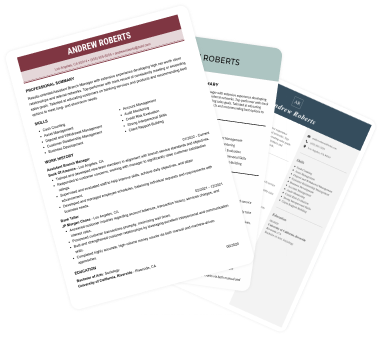
Graphic Design CV Examples, Template & Guide
How to write a graphic design CV? Check our graphic designer CV examples, personal statement writing tips, and ways to stand out from the pile of CVs.
December 29, 2025
Last updated on 29 December, 2025
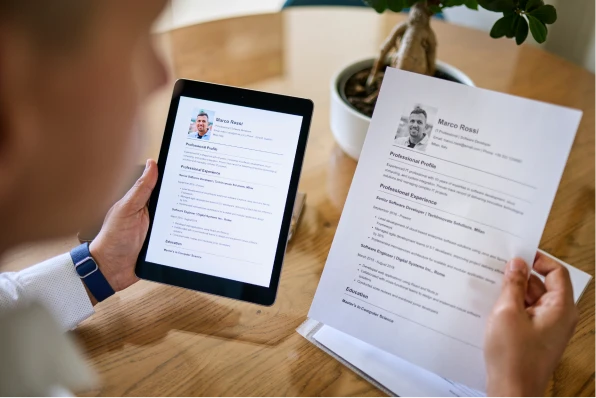
Our customers have been hired by*:
The hobbies and interests section on a CV is often overlooked. However, when used wisely, it can add real value. Especially if you don’t have much work experience.
Take a short break from your current hobby, because I’m about to teach you how to create an interview-worthy section that will not only show your personality traits, but also prove some of your skills.
This guide will show you:
Create an effective CV in minutes. Choose a professional CV template and fill in every section of your CV in a flash using ready-made content and expert tips.
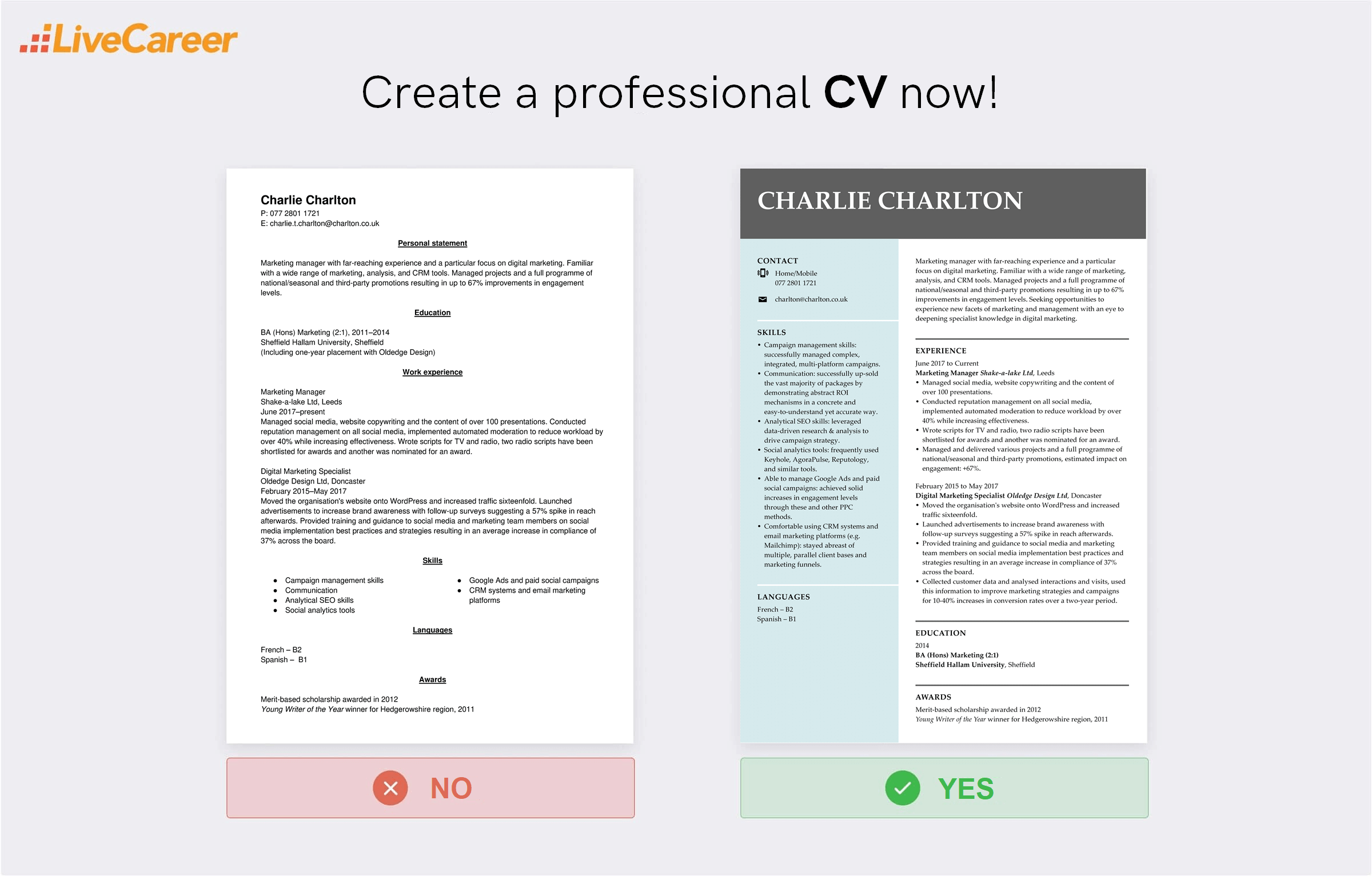
We created the sample on the left using our builder. See other good CV examples like this one.
If you prefer watching, our Certified Professional CV Writer, Caio, will explain in detail everything about hobbies on a CV!
Yes, you should put your hobbies and interests on a CV. It’s a great way of making your job application stand out. With a little care and attention, you can easily give your CV a boost. Demonstrating interests outside of work helps you to stand out as a unique individual, while adding some personalisation to your document.
Plus, if you have a hobby or interest that the hiring manager shares, you get an amazing conversation starter. Studies show that we’re drawn to people who are like-minded to us. That means they’re more likely to think favourably of you as a candidate.
Hobbies and interests are particularly useful if you’re early in your career. So if you’re writing a school-leaver CV or a CV with no experience , it’s definitely worth including. More caution is needed when applying for more senior posts, though.
The problem is, the more experienced you are, the longer your CV gets. And you should only be writing a one or two-page CV, so it might not make sense to squeeze in hobbies and interests at the expense of other, more important skills and work experience. That said, if it’s particularly relevant or helps you build a relationship with the hiring manager, it’s worth considering.
In short, include hobbies and interests when they:
So now that you know how useful interests and hobbies are for your CV, let me explain how to write a CV that shows them effectively. Below, I'll cover everything about what a CV should look like to nicely emphasize hobbies and interests.
A strong CV summary will convince the recruiter you’re the perfect candidate. Save time and choose a ready-made personal statement written by career experts and adjust it to your needs in the LiveCareer CV builder.
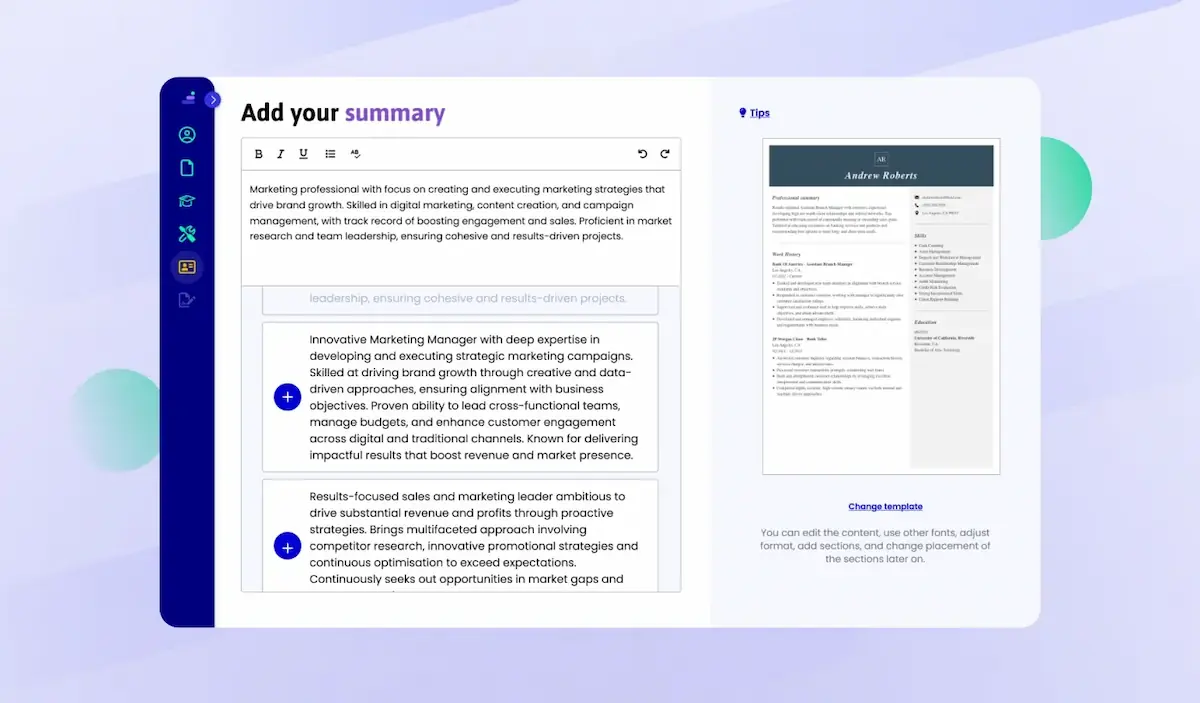
Hobbies and interests belong in an optional section at the very end of your CV—after your skills section, and definitely after your work experience and education. That’s the standard placement used in classic CV templates. It ensures that more critical information is reviewed first.
Label the section clearly with a simple, professional heading like “Hobbies and Interests”, “Personal Interests”, or “Outside Interests”—whichever fits your tone and industry best. This section should be concise, relevant, and thoughtfully written—not just a casual list of pastimes. Remember, everything on your CV should serve a purpose or add value.
Avoid placing it too high up in your CV unless it’s strategically important (e.g., you’re applying for a cultural role, early-career position, or creative job where personal flair and individuality are valued). In those cases, it can act as a differentiator and help paint a fuller picture of who you are.
When writing a list of hobbies and interests for a CV, you should only include interests linked to the personality traits and skills demanded in a particular role. This way, you can show you'll add value to the company. Pick only a few hobbies and interests (5 maximum) and write a brief description for each.
1. Start by learning about the company
Before deciding what hobbies or interests to showcase, take a moment to explore the company you’re applying to. This helps you tailor your resume to resonate with their values and work environment.
2. Select interests that align with the role
When listing hobbies on your resume, be intentional. Your choices should reflect attributes the employer is seeking. This makes your interests more than just filler; they become part of your personal branding.
3. Let your hobbies reinforce your qualifications
If you’re applying for a role where you lack direct experience, hobbies can offer subtle żproof of transferable skills. Choosing the right ones can strategically fill in those gaps and add value to your profile.
4. Place hobbies in a distinct section toward the end
Keep your resume sleek and targeted by creating a short, dedicated section for hobbies near the bottom. It adds personality without overwhelming the core content.
5. Limit to a maximum of five unique activities
Don’t overdo it. This section should complement, not clutter, your resume. Stick to a focused selection that adds value without taking up unnecessary space.
Let’s take a quick look at the example of how to do it right:
Hobbies and Interests
That’s pretty straightforward, right? But what hobbies and interests for a CV work best?
Choosing the right hobbies and interests for your CV can do more than just fill space. When done right, this section can highlight your personality, strengthen your skill set, and help you stand out from other candidates. The best hobbies and interests align with the role you’re applying for and reinforce qualities employers value.
Those were just a few examples of hobbies and interests for a CV. There just isn’t enough room to list them all. The key to choosing is to ensure the hobby or interest you choose is relevant to the job in question.
After analysing 6 million CVs created with our builder, we found out that*:
*The data comes from a period of the last 12 months (August 2023-August 2024).
Hobbies and interests can demonstrate skills. They are a particularly powerful choice, as skill-based hiring is on the rise. Let me show you how some of your hobbies and interests can prove some of your traits.
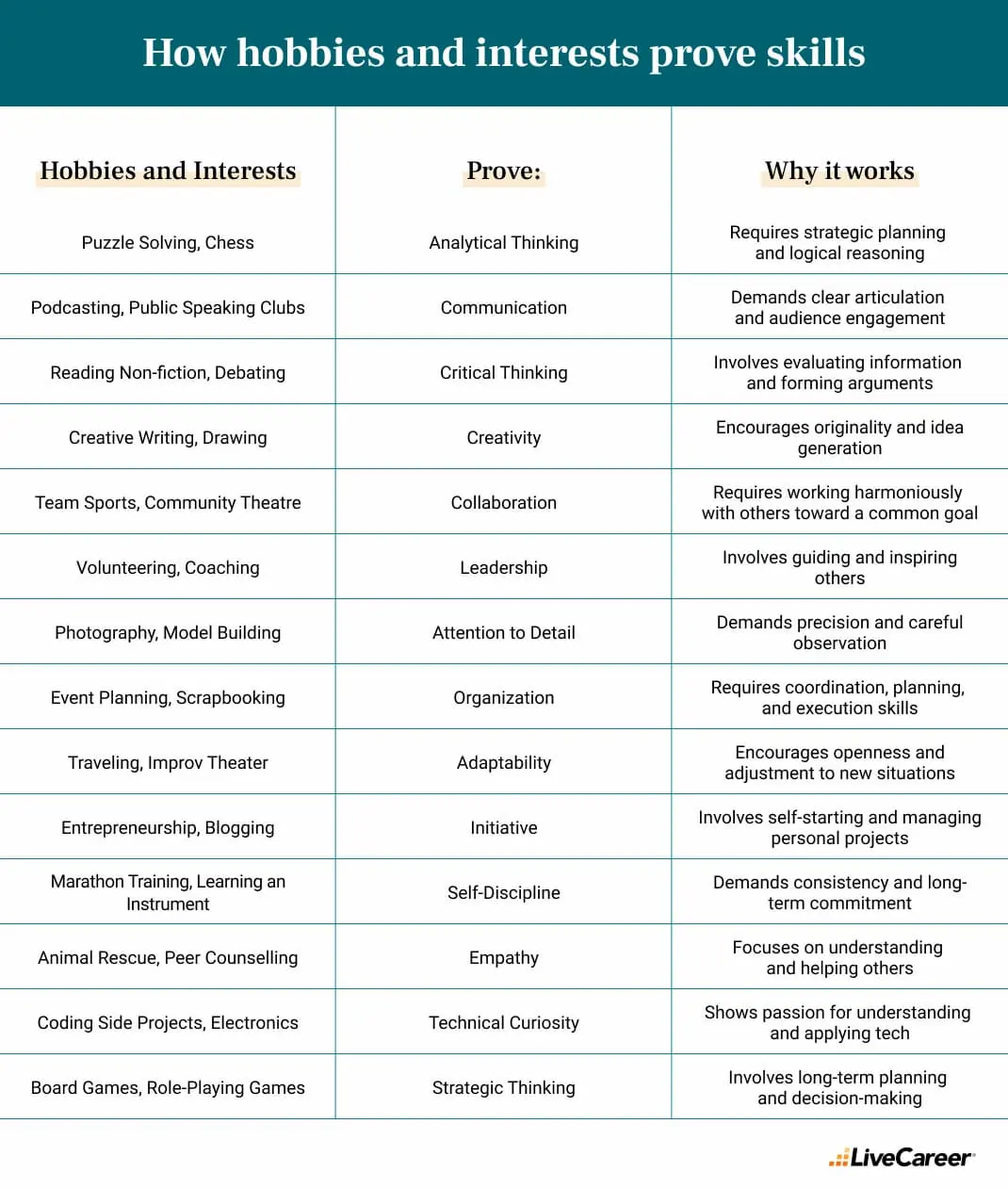
I believe you’re now fully convinced that adding some hobbies and interests to your CV can convince your recruiter you’re truly a job-worthy candidate.
And that's everything you need to know about creating a CV that emphasises hobbies and interests. Hobbies and interests on your CV are a great idea, as long as you use them appropriately. Ensure they’re relevant and help your CV show you off as a well-rounded person and skilful potential employee.
You don’t have to be a CV writing expert. In the LiveCareer CV builder you’ll find ready-made content for every industry and position, which you can then add with a single click.
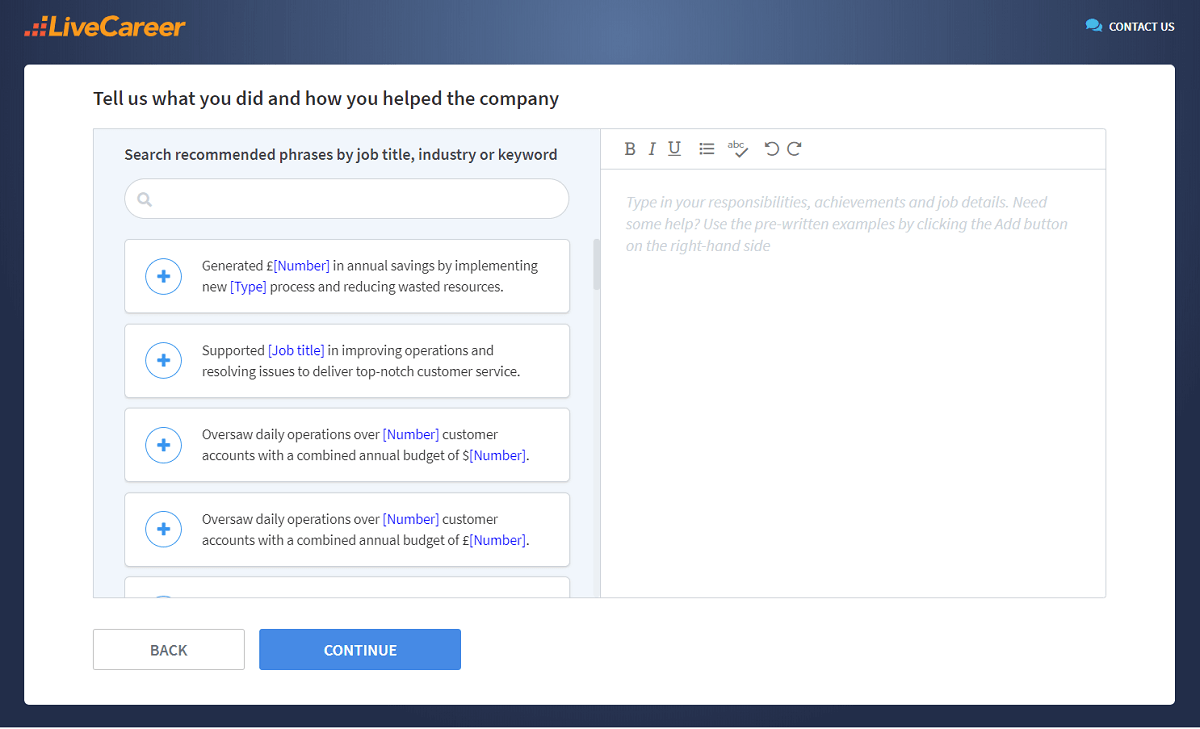
Thanks for reading. If you still have any doubts about which hobbies and interests to put on your CV, ask in the comments section, and I’ll be happy to help.
Seeking guidance on how to cover other CV sections? Check these articles:
*Data was collected from July 2023 to June 2024.
Our editorial team has reviewed this article for compliance with LiveCareer’s editorial guidelines. It’s to ensure that our expert advice and recommendations are consistent across all our career guides and align with current CV and cover letter writing standards and trends. We’re trusted by over 10 million job seekers, supporting them on their way to finding their dream job. Each article is preceded by research and scrutiny to ensure our content responds to current market trends and demand.
While often grouped together, there’s a subtle difference between hobbies and interests:
Yes—strategically chosen hobbies can highlight transferable skills and show initiative when formal experience is limited. For example, managing a blog shows writing and self-discipline, while organising local events demonstrates project management and communication skills. This is especially useful for students, career changers, or those re-entering the workforce.
Aim for 2 to 5 well-chosen examples. Focus on quality, not quantity. The goal is to include activities that reflect relevant soft skills or values, not to list every pastime. A tight, relevant section adds personality without cluttering the page.
There are some hobbies and interests you should avoid listing on your CV.
Category: CV Help
Crafting a job-winning CV is all about showcasing your unique skills and experiences. Start with a strong personal statement that highlights your career goals and achievements.
Try Our CV Builder Now